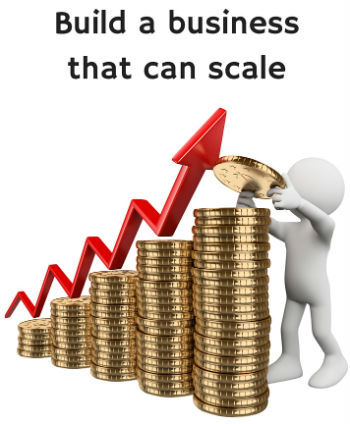5 Characteristics Of A Scalable Business
 When entrepreneurs start a business, all they think about is how to grow it. What are the characteristics of a scalable business?
When entrepreneurs start a business, all they think about is how to grow it. What are the characteristics of a scalable business?
What does it even mean for a business to be scalable?
In this post, I'm not going to talk about how to be the next Facebook or huge tech company. I'm going to give you practical advice to build and grow a sustainable small business. Below is what I believe are the 5 characteristics of a scalable business.
1. A Vision To Believe In
Everything in your business hinges on your vision. If you can't create a vision, articulate it to others, and get them to believe in where you are going with the business, you are not going to grow.
According to Forbes "Employees who find their organizations’ vision meaningful have engagement levels that are 18 percentile points above average."
A vision should not be confused with a mission statement. A vision statement talks about the future of where the business wants to go and should inspire employees as well as create guidance. A mission statement is about the present state of the business and defines what the business does, who it services, and how it functions.
2. A Solid Small Business Team
Once you have a vision of the business that you want to build, you are going to need a team to help you complete that vision. No successful business got to where they are all on their own.
When you go to build a team, don't look for people who are just like you. Look for people who are different from you and better than you.
Nobody is better than you? Good luck with building a successful business.
You need to find people who are better than you at different aspects of the business. A diversified team will help you scale your business quickly because of the differences in skills and perspectives.
3. A Process That Is Documented
If you really want to grow a business, you need a solid process. Not only do you need a process, but you need to have it documented.
Build your business so that you could die tomorrow and someone could come in, read your business process manual, and know exactly how the business operates.
As your business grows, so will your processes and you need to update the documentation. Not only is a documented process good for scaling, it is also good for selling a business.
Think about the scenario where you are considering buying a business. If you find two businesses with similar sales and one has a detailed process manual while the other one doesn't, which one will you buy?
4. Good Cash Flow
I recently wrote an article about how cash flow shortages kill small businesses all the time. If you are going to scale your small business, you are going to need cash.
The problem is that in the beginning, almost every small business owner has no cash.
When you are bootstrapping your business, you are relying on creating operating income to grow. What you need to learn is how to create a good cash flow stream.
Here are some ideas on creating good cash flow:
- Create recurring revenue. If you can build a business that has repeatable income at regular intervals, your cash flow will be easier to predict.
- Invoice your customers right away and make it easy for them to pay. I've seen a lot of businesses (ourselves included) hold off on accepting credit cards due to merchant fees. Build that cost into your service fees and email invoices that can be paid with the click of a button.
- Hold off on paying bills until they are due. When you get an invoice, don't feel obligated to pay it right away. Look at the terms and hold off on paying until a few days before it is due. Also, pay with a credit card when it is an option to push out the actual movement of cash as long as possible.
5. Marketing & Sales
If you have completed the steps above, then your business is already pretty scalable. However, when it comes right down to it, a business is not going to scale with just customers and sales.
Growing a business always leads back to marketing and sales.
Even if you create an inspirational vision, get a solid team behind that vision, and have an awesome process, you are nothing without revenue. If you want to scale, you need to learn how to market your product or service and create sales.
It is the job of marketing to drive prospects to sales, and the sales department needs to convert qualified leads into customers. There is no point of converting unqualified prospects into customers; that is why it is important to learn to disqualify some prospects.
What advice do you have for a small business that is looking to grow?
Photo Credit: Canva


Comments